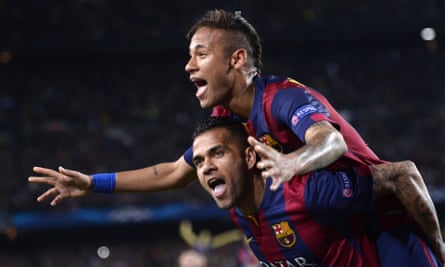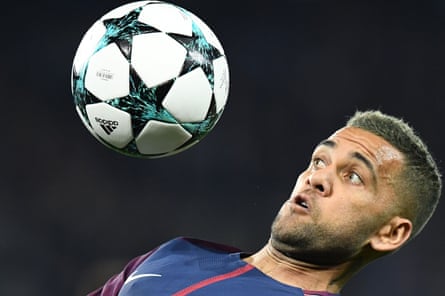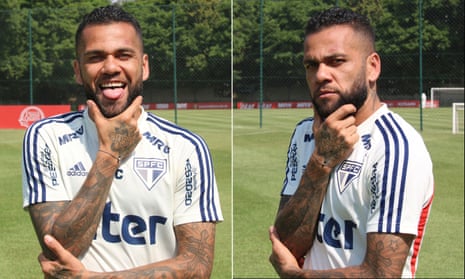Dani Alves has won more major trophies than any footballer in history. He spent 17 years playing for some of Europe’s biggest clubs, redefining the nature of his position. And this July he captained Brazil to glory at the Copa América, his country’s first major silverware in over a decade. So, what does he still have left to prove? The answer, it seems, is quite a lot.
Alves has returned to live in his homeland for the first time since he left Bahia as a teenager in 2002. Many Brazilian stars come back to enjoy a few years of comfort before hanging up their boots, but he quickly lays that notion to rest. “I adore challenges,” says Alves with a smile. “I love it when nobody believes that things will happen and you go there and do it. That’s my passion. That lights the flame inside me.”
For now, two challenges are keeping that flame alight: his desire to restore São Paulo to their former glories and, ultimately, his ambition to win the World Cup in 2022. Alves will be 39 by the time the tournament begins, but he is deadly serious about making it to Qatar. “It’s my dream,” he says.
Alves was born in Juazeiro, 2,000km north of Brazil’s biggest city, but São Paulo are part of the reason he fell in love with football. “I’ve been a São Paulo fan since I was a child,” he says. “I’ve always liked being a champion and São Paulo were champions, champions, champions. My dad had a team called São Paulo too, an amateur team. He’d put the lads from the farms together to play.” When playing for that team, Alves would imitate Cafu, who helped São Paulo win back-to-back Libertadores and Intercontinental Cup titles in 1992 and 1993. “My childhood hero was my dad and second, Cafu, because of the position he played, because of his story. I like the story more than just the way of playing. Cafu’s story of persistence is fucking amazing. It gave me great hope.”
He was picked up by big local club Bahia as a boy, before being whisked off to Sevilla at the age of 19. “It was very quick,” he recalls. “I played one and a half championships for Bahia and went. That was the most difficult period of my career. I came from playing every game to not even being on the bench. It was a big shock. However, I learned early that it is during hard times that you really learn who people are, whether they take a step forward or backwards. I always found a way of getting results rather than looking for excuses. I started to do more to understand what the coach wanted. I wanted to find out what I needed to do to live up to expectations. And I ended up having a marvellous time at Sevilla. Together with my teammates, we changed the history of Sevilla.”
All these years later, winning that first Uefa Cup final against Middlesbrough in 2006 remains his favourite achievement. “The best moment of my career was when I won the first title with Sevilla,” he says. “It was with a team that, when I arrived, was battling against relegation. Being part of that reconstruction is an ecstasy of emotions. You see everyone crying, people happy in the city. A story started to be written there. Being part of that is sensational.”
His success with Sevilla helped him secure a move to Barcelona. “From there, I got to the most desirable place in world football, not just because of the players they have, but because of the identity, the quality of their game, the value they add to football. They really fight for the word ‘football’. It was a school, it is a school and it will continue being a school of football concepts. I’ve never seen anything like it. I had offers from other big clubs, but they didn’t offer me the chance of building something new. Barcelona was in that transition. After Ronaldinho, they dropped off a bit and wanted to get back to being what they were. I’d already made history as part of the reconstruction of a club, so I wanted to do that again.”

He sees his mission with São Paulo in the same light. The club have not won the league since 2008 and have not laid their hands on any silverware since 2012. Taking them back to that level is his passion project. “I’ve come to São Paulo to tell the story of a fan who has come to play for the club he supports. And who is going to fight for this club more than any other fan. I’m doing something no other fan can. I’m there, on the pitch supporting and playing at the same time. I’m playing for the club I dreamed of playing for. São Paulo is the only club I would play for, knock on wood, if they went down to the second division.”
When Alves was unveiled by the club in August, he was given a hero’s welcome, received by 45,000 people in the Morumbi stadium and handed the No 10 shirt by Kaká. He has mostly been playing a free role in the centre of midfield. “I’m a full-back who plays a combination game. But here – because of the characteristics of Brazilian football, the way the team plays and, a lot of times, the teammates – you don’t have so many [short-passing] combinations. If I play in the position I did for 20 years, I can’t interfere as much in the game.
“When I get involved, I help my teammates to become better. It’s been like that my whole career – at Bahia, Sevilla, Barcelona, Juventus and PSG. Those clubs have a history of having done that for a while. Here, the coach changes all the time and you’re always trying to adapt to the coach you have. In my position in the middle I’m better for my teammates. I’ll be sincere, I created a new way of playing as a full-back. No false modesty. I am always adapting to my teammates. If they’re wide, I’ll go into the middle. If they’re attacking, I’ll help with the control. If the ball’s on the other side, I tuck in. I play as a creative midfielder from the back.
“Barcelona gave me this understanding. When I played with Xavi or Rakitic, there was always a player controlling the game. If I was wide, Xavi or Rakitic were behind me. Seeing them play, I thought: ‘When you have a winger who stays wide, you need to stay in the area of control.’ At São Paulo, my challenge is to be able to understand my teammates and to combine with them as well as possible.”
Pep Guardiola, he says, was vital in developing his positional game. “This understanding is one of the greatest qualities for players who can manage it. There are a lot of people who want the ball, want the ball, want the ball. Sometimes they could cause more harm without it. That’s what I did at Barcelona. When Pep taught me how to play without the ball at Barcelona, that season I got something like 18 assists.”
Has Guardiola dome something similar with Raheem Sterling at Manchester City? “The same thing. Obviously, you have to have players to execute it. If the executors are not so good, the quality is not so high. The most interesting thing is that Pep always manages to find quality. That’s why players always stand out with him.”

Alves does not limit himself to improving his team on the pitch. He wants to help his club and Brazilian football as a whole. “The clubs must try to create a collective playing identity. Brazilian football needs to reinvent itself in this regard. For individual quality, I’ve never seen a country like it. Every year, there are innumerable quality players. But you see a lot of individuality. There aren’t clubs that are brilliant for a long time because of their collective play.
“If you have a clear idea, you are less likely to change the manager every year. There are clubs that have two or three coaches in a year. It’s madness. You never create stability. There needs to be better planning. You have to make important choices and really back them. That’s what generates stability inside a club and a team. We should mirror European clubs, who create an identity. It’s rare to see a big European club that one year is fighting for the title and the next is fighting to avoid relegation. Because the clubs are stable. São Paulo has a great identity as a club that really cares about its academy, but they don’t take care on a collective level. I want to bring in a bit of the experience I had abroad of how you can make a club better.”
He is not the only one. In the last few months, Filipe Luís, Rafinha, Ramires and Luiz Adriano have returned to Brazil. “It tells you that Brazilian football is evolving,” says Alves. “Clubs are bringing in players who’ve constructed great careers and would still attract interest from Europe. Some of them are my friends and they know they can bring a lot to Brazilian football and help the younger players in their lives. Here in Brazil, you have to be mentally stronger than in any other place because of all the demands. Everything turns into a meme, a joke or taking the mick.”
Alves sees himself as a positive role model for young players. “You need examples to act as a mirror. There are lots of examples here in Brazil that, let’s say, are fogged-up mirrors. They need more professional examples of how to respect the profession, respect football and its rules, respect their career as a high-level profession. That’s a bit of the idea behind us coming back to Brazil.”
As well as the opportunity to be part of a rebuilding project, Alves was attracted by São Paulo’s offer of a contract that runs until December 2022. The European clubs chasing his signature only offered 12-month deals. “I wanted the stability to be able to fight for my dream, which is playing the 2022 World Cup. The other clubs didn’t believe in my potential. They think I don’t have anything to offer any more. I’m going to show that, if you’re willing to pay the price, you can do what you want.”

Has Brazilian society changed since he left? “I see some improvements and the continuation of some erroneous things. Corruption and violence exist everywhere, but are greater here because of the size of the country, the size of the population, the poverty. We are a bit of a selfish country. People don’t worry about others enough. It’s always ‘me’, never ‘us’. But nobody lives like Brazil. We are a people that, despite the difficulties, enjoy the world more than any other. People should focus on the incredible things the country has. From the moment you start thinking about the human being, rather than what they do and what they can offer you, things start to become more caring.”
The issue of prejudice has come up recently in football, something Alves experienced first-hand at Villarreal in 2014. A banana was thrown at him from the stands, which he picked up and ate. Asked about how best to confront the problem of racism, he does not seem too hopeful. “It’s never going to end. The less importance you give it, the better you will live. Giving it less importance is not acceptance. You can’t accept that people humiliate you. When I did that [ate the banana], they created a campaign. I said: ‘Sorry, I don’t want to be involved in campaigns that won’t achieve anything.’ The awareness raised is momentary. People will forget afterwards.”
Neither does he believe that punishing clubs is the way forward. “How are you going to punish a club for the actions of one person, 10 people, 50 people? It wouldn’t be fair. It would be fair if you catch the perpetrator and punish them. In football, like in any other area, there is no space for racists. You have to identify the culprit and punish them. The rest are not at fault.”
Alves hopes his energy will influence those around him positively, but do people under-appreciate him because of his gregariousness? “If they do, that’s their problem. What matters is what I give people. I want people to have fun, to smile. Sometimes, people are too bitter. My objective is always to give my best to people. I might be crazy, but I’m a good kind of crazy. I want everybody to be happy.”

By now he has kicked off his football boots and is leaning back in his seat, giving long, meandering answers on any subject that crops up. “I have a lot of theories,” he says. “I believe if your life follows a straight line, you have a dead life. Life has to oscillate and you have to try to make the ups greater than the downs.”
On the topic of ups and downs, Alves was voted player of the tournament as Brazil won the Copa América on home soil, yet it was a strange tournament marred by low attendances, poor pitches and ill-tempered crowds. Did that negativity affect the dressing room? “No. The Venezuela game [a 0-0 draw after which they were booed] was better than some of the games we lost, but people don’t want to know because the result was a draw. Your effort makes no difference; you have to get the results. We started to think: ‘What is the final objective?’ To win the Copa América. We have to go through phases. We’re not going to stroll through, smoking a cigar and drinking champagne. No, my friend. No. You have to ralar a bunda no chão [scrape your bum on the floor].
“That redoubled my confidence in my team. I knew nothing would shake us. The team knew what it was doing. That’s what matters. If you beat Venezuela and lose the semi-final to Argentina, you’re fucked. We said: ‘Be calm. The result didn’t come. Breathe deep and on to the next one.’ That’s the maturity of a great side.”
After the title was won, many in Brazil suggested the team had performed better because of Neymar’s absence. Alves will not even entertain this theory. He scoffs and, unusually, is temporarily lost for words. “Those people don’t know anything about football,” he says once his initial disgust has passed. “It’s impossible, impossible, impossible, impossible that the Seleção will be better without a special guy like Ney.”
Now, Alves’ eyes are fixed firmly on the biggest trophy of all. “I’m going after that dream to be champion, to close an era with the Brazilian national team, to help my country get back on top. You know what motivates me most? When everybody stops believing in me. When they say: ‘This guy is worthless, this guy can’t play in midfield, can’t do this or that.’ Just wait. On the way there I’m going to work like a filho da puta, like I’ve done all my life. That’s why I came here. I was comfortable in Europe, but I like discomfort. Nothing in life is easy. If you want to reach you objectives, you have to make the effort. Unless your dad owns the team – when my dad ran our São Paulo, I always played and played up front.”
Despite his jovial exterior, it is this drive that has carried him from his dad’s São Paulo team to the real thing. A few days ago, he says, “[São Paulo director Diego] Lugano came and asked me: ‘How is it that this little body, these skinny legs, have won more titles than any other in the history of football?’ My reply is that it’s not my body, it’s my soul. My body might look fragile, but it’s here and here,” he points to his head and bangs his right palm over his heart.
“Success is giving your best. Achievement is depriving yourself of things to get to where great young people aim to be. You have to say: ‘I’m here, focused. I’ll put my blinkers on and nothing will put me off.’ Sometimes in life you have be deaf, dumb and blind and let your soul carry you to get closer to your objectives. If you win without sacrifice, without effort, you will triumph with no glory at all.”

Comments (…)
Sign in or create your Guardian account to join the discussion